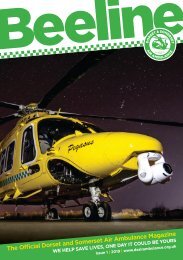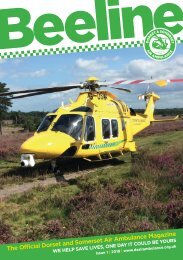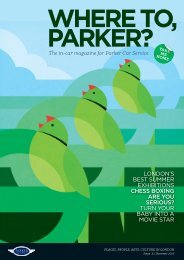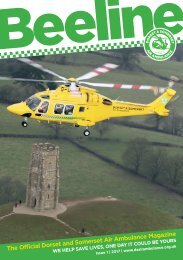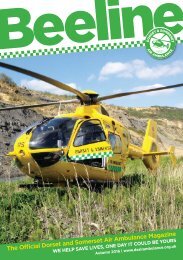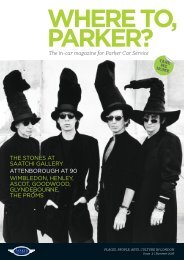Beeline: Dorset & Somerset Air Ambulance Magazine, Spring 2016
Dorset & Somerset Air Ambulance Magazine, Spring 2016
Dorset & Somerset Air Ambulance Magazine, Spring 2016
You also want an ePaper? Increase the reach of your titles
YUMPU automatically turns print PDFs into web optimized ePapers that Google loves.
WHAT WE DO<br />
Clinical update<br />
The last six months have been another<br />
extremely busy time for the crew of<br />
<strong>Dorset</strong> and <strong>Somerset</strong> <strong>Air</strong> <strong>Ambulance</strong><br />
n April, we make the transition to providing<br />
I<br />
pre-hospital critical care for 12 hours a day,<br />
seven days a week. This means that our crew<br />
will consist of a Critical Care Paramedic (CCP) and Critical<br />
Care Doctor, on duty, every single day.<br />
This is important news for the people of <strong>Dorset</strong> and<br />
<strong>Somerset</strong>, as while we have been providing pre-hospital<br />
critical care for a large proportion of our shifts, the<br />
public can now expect us to deliver drugs including<br />
pre-hospital anaesthetics, perform surgical procedures<br />
and give organ support to critically ill patients, at the<br />
scene of an incident, on any given day.<br />
With the formation of this team comes the capability<br />
to provide more inter-hospital transfers and the<br />
administration of pre-hospital anesthesia to critically<br />
ill or injured patients that need it. Being able to do the<br />
latter means that our team can also deliver life-saving<br />
surgery or other critical care procedures at the scene of<br />
an incident before taking the patient to hospital.<br />
We have been working towards this for the last six<br />
months and between December 2015 and March <strong>2016</strong>,<br />
93.5 per cent of clinical shifts were covered in this way.<br />
Outside those shifts, the aircraft was manned by a team<br />
made up of two CCPs.<br />
Over the 2015 winter period, our team provided a<br />
12-hour service – 10 hours on the aircraft and the latter<br />
two hours (during darkness) via our Rapid Response<br />
Vehicle. The mode of transport obviously plays a key<br />
factor in us being able to reach patients as quickly as<br />
possible and our helicopter can cover an extremely<br />
large area in a very short time. However, what’s more<br />
important is that when the helicopter is not available,<br />
we still have the capability of bringing the Emergency<br />
Department to the patient.<br />
We have also been continuing our work with the<br />
Helicopter Emergency Medical Service (HEMS) desk<br />
and with the South Western <strong>Ambulance</strong> Service NHS<br />
Foundation Trust (SWASFT) road crews, to ensure we<br />
are mobilised to patients that need us. In order to make<br />
the best use of our Critical Care Team, CCP Neil Bizzell<br />
has been leading an ‘outreach’ programme to provide<br />
knowledge on our capabilities to all involved.<br />
Claire Baker, Neil Bizzell, Phil Hyde, Ian Mew, Paul<br />
Owen and Michelle Walker have been providing teaching<br />
sessions to a variety of other SWASFT staff, clinicians<br />
12 01823 669604 | www.dsairambulance.org.uk




